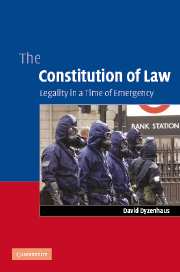1 - Legality in a time of emergency
Published online by Cambridge University Press: 10 December 2009
Summary
Introduction
This book explores the idea that there is a constitution of law, exemplified in the common law constitution of Commonwealth countries. It looks mainly to cases decided in the United Kingdom, Australia, and Canada in order to show that law provides a moral resource that can inform a rule-of-law project capable of responding to situations which place legal and political order under great stress, for example, states of emergency or executive decisions about national security. My argument is that the rule-of-law project is one in which judges play an important role but which also requires the participation of the legislature and the executive.
Two obstacles to such an argument will strike anyone familiar with the history of legal responses to such situations. First, in such situations the government usually claims that the exceptional nature of the situations requires a departure from the rule-of-law regime appropriate for ordinary times and so whatever role one accords to judges in ordinary times has to be significantly rethought. And often the government will follow through on this claim by procuring through a statute powers for itself which seem to permit it to act outside of the ordinary constraints of the rule of law. The government could be wrong in the claim that it needs such powers, but, and this is the second obstacle, as a matter of fact the judicial record in enforcing the rule of law in such situations is at worst dismal, at best ambiguous, and this fact might serve to buttress the government's claim.
- Type
- Chapter
- Information
- The Constitution of LawLegality in a Time of Emergency, pp. 17 - 65Publisher: Cambridge University PressPrint publication year: 2006
- 1
- Cited by



